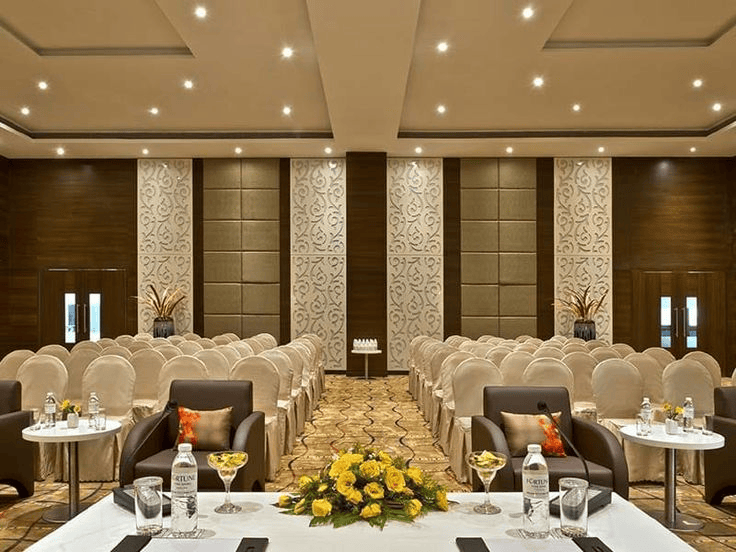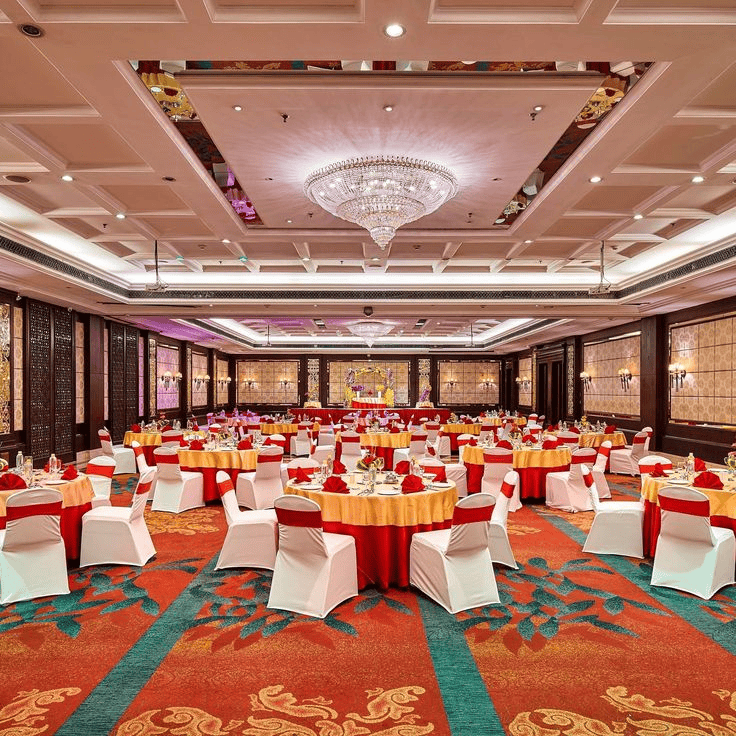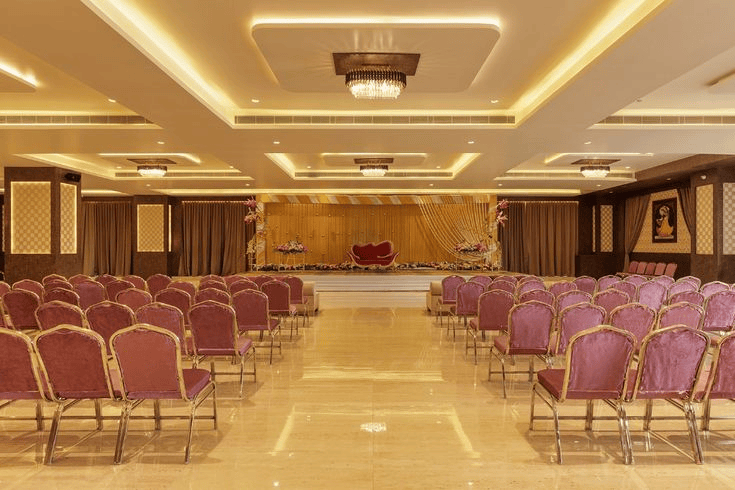How to Start a Banquet Hall Business in India?

India's event and hospitality sector is booming, driven by a rich culture of celebrations, weddings, and corporate gatherings. This creates a huge opportunity for aspiring entrepreneurs looking to venture into the banquet hall business.
The surge is fueled by a growing middle class, increasing disposable incomes, and a desire for professional, well-managed spaces for various events. This vibrant landscape presents immense opportunities for those aiming to establish a successful presence in the hospitality industry.
However, launching a successful banquet hall business in India requires more than just a good location. It demands a strategic approach that encompasses thorough market research, a robust business plan, adherence to legal formalities, effective team building, and a strong focus on client acquisition and retention.
Step-by-Step Guide on Starting a Banquet Hall Business in India
To start a banquet hall business in India, begin with thorough market research, secure all necessary licenses, and create a solid business plan. Choose a strategic location, invest in a well-equipped venue, hire skilled staff, and focus on delivering exceptional customer service to succeed in this competitive market.
1. Planning and Research
- Market Research: Analyze the demand for banquet halls in your chosen location, assess the competition (other banquet halls and event venues), and identify your target market (e.g., weddings, corporate events).
- Business Plan: Develop a comprehensive business plan that outlines your goals, strategies, financial projections, and operational procedures.
- Location: Select a location that is easily accessible, offers ample parking, and is well-suited for the types of events you intend to host. Consider factors such as proximity to transportation hubs and local amenities.
- Legal and Regulatory: Obtain all necessary licenses and permits, including those for food safety, fire safety, and business registration.
2. Venue and Infrastructure Setup
Setting up a well-designed, fully equipped, and safe venue is crucial to delivering a great experience to your clients.
- Property Acquisition: Decide whether to lease or buy the property. Leasing is ideal during the initial phases to reduce capital investment.
- Venue Design & Setup: Plan the layout to accommodate various event types and ensure smooth guest movement.
- Decor and Aesthetics: Invest in attractive interiors, creative lighting, professional sound systems, and event-appropriate décor.
- Essential Facilities: Provide sufficient parking, clean restrooms, a modern kitchen, and comfortable seating arrangements.
- Accessibility: Ensure the venue is accessible for differently-abled individuals with ramps and accessible restrooms.
- Air Conditioning & Ventilation: Install efficient HVAC systems for guest comfort, especially in hot and humid areas.
- Power Backup: Set up high-capacity generators or UPS systems to ensure uninterrupted electricity during events.
- Safety & Security: Install CCTV cameras, hire security personnel, implement emergency exits, and ensure fire safety compliance.
- Storage Facilities: Allocate space for storing event equipment, decorations, and catering supplies.
- Waste Management: Implement a hygienic system for managing food and general waste effectively.
3. Operations and Staffing
Efficient operations and a skilled team form the backbone of any successful event business.
- Establish Operational Systems: Streamline booking, planning, event execution, and customer feedback processes.
- Technology Integration: Use event management software for scheduling, invoicing, bookings, and client communications. Implement CRM systems for better relationship management.
- Hire Skilled Staff: Employ experienced professionals in catering, hospitality, customer support, cleaning, and maintenance.
- Vendor Management: Build a network of reliable vendors for decoration, florists, DJs, photographers, valets, and more.
- Training & Development: Regularly train staff on event management, food safety, customer service, and emergency protocols.
- Contingency Planning: Prepare backup plans for emergencies like power outages, staff shortages, or last-minute cancellations.
4. Marketing & Promotion
A strong marketing plan is essential to attract and retain clients in a competitive market.
- Build an Online Presence: Launch a professional website and maintain active social media profiles to showcase services and events.
- Leverage Reviews & Testimonials: Encourage happy clients to leave reviews on Google, Instagram, Facebook, and wedding/event platforms.
- Run Targeted Campaigns: Use online advertising, email marketing, and influencer tie-ups to reach your audience.
- Develop Promotional Packages: Offer themed or seasonal packages to attract clients during peak and off-peak seasons.
- Networking & Partnerships: Collaborate with wedding planners, hotels, photographers, local vendors, and travel agents to generate leads and referrals.
- Highlight Your USP: Promote what makes your banquet hall unique—eco-friendly design, luxury ambiance, specific services, or pricing.
5. Financial Management
Sound financial planning is vital to sustain operations and ensure long-term profitability.
- Cost Analysis: Calculate setup costs, operational expenses, staff salaries, and marketing budgets.
- Set Pricing Strategically: Offer competitive rates based on location, service quality, event size, and seasonality.
- Funding: Explore funding through bank loans, NBFCs, MSME schemes, or angel investors.
- Insurance: Get insurance for property damage, liability, employee safety, and fire to manage potential risks.
6. Post-Launch & Growth Strategy
After launching your banquet hall, focus on improvement, expansion, and customer satisfaction.
- Implement Feedback Mechanism: Collect client feedback through surveys, follow-up messages, or digital forms to improve service.
- Diversify Offerings: Host different types of events—corporate meetings, art shows, concerts, product launches, etc., to maximize venue usage.
- Track Performance Metrics: Regularly monitor bookings, customer satisfaction, revenue growth, and marketing ROI.
- Plan for Expansion: Consider opening new branches, franchising your brand, or upgrading facilities as your brand gains popularity.
Legal & Licensing Requirements for Banquet Hall Business in India
To operate a banquet hall business in India, a variety of legal and licensing requirements must be fulfilled, which can vary based on the specific location and the services provided.

- Trade License: This is a fundamental requirement for any business, including banquet halls, and is obtained from the local municipal authority.
- Fire Safety NOC: Ensures the premises comply with fire safety standards and is issued following an inspection by the relevant fire department.
- Pollution Control NOC: If the banquet hall's operations generate any form of pollution, a NOC from the pollution control board is necessary.
- FSSAI License: If the banquet hall provides food and beverages, an FSSAI license is mandatory. The specific type of license (Basic, State, or Central) is determined by the annual turnover.
- Building Plan Approval / Occupancy Certificate: The construction of the banquet hall must be approved by the relevant authorities, and an occupancy certificate confirms its adherence to safety and other standards.
- Property Ownership Proof: Documents verifying ownership or leasehold rights of the property are required.
- Police License: In certain jurisdictions, a license from the police department may be necessary for public entertainment venues.
- Bar License: If alcoholic beverages are served, a bar license from the state government is essential.
- Health License: This license ensures the banquet hall meets prescribed health and hygiene standards, particularly when food is served.
- Amusement Activity License: If the banquet hall hosts amusement activities such as music, dancing, or laser shows, a separate license from the municipal authority might be required.
- Loudspeaker Permit: If the banquet hall utilizes loudspeakers or sound systems, permission from the local authorities may be needed.
- Premises License: This license is required to authorize the use of the premises for licensable activities, such as hosting events.
- Public Performance License: If music is played, a public performance license might be required, especially for recorded music or live performances.
Get Your Company Registered Today
Free consultations for MCA approvals to help you get started with your business.
Infrastructure, Design & Banquet Hall Investment Cost in India
The cost of investing in a banquet hall in India can vary significantly based on location, size, quality of finishes, services offered, and the target clientele.
Here's a table summarizing estimated investment costs for infrastructure, design, and specific components:
| Category | Sub-Category | Estimated Cost Range (INR) | Notes |
| Infrastructure | Land Acquisition/Lease | Highly Variable | This is the most significant cost and depends heavily on the city/town, locality, and size of the plot. Prime locations in metro cities will be substantially more expensive than smaller towns or rural areas. |
| Construction Cost | ₹1,000 - ₹2,500 per sq. ft. or more | This includes the raw building structure, foundation, walls, roofing, basic plumbing, and electrical. The cost can go higher for premium construction quality and specialized structures. Some sources indicate as low as ₹230/sq ft for basic construction services, but this would likely be for very basic structures and not a finished banquet hall. | |
| Parking Facilities | Varies based on capacity | Essential for a smooth guest experience. Regulations often require a certain number of parking spaces (e.g., accommodating at least 50 cars and 5 coaches for convention hall licenses). | |
| Utilities Hook-up | Varies | Connection to water, electricity, sewage, and gas lines. | |
| Design & Interiors | Architectural & Structural Design | Varies (often percentage of construction) | Professional fees for designing the layout, structure, and overall aesthetic. |
| Interior Design | ₹1,000 - ₹3,000 per sq. ft. | This covers flooring, wall finishes, ceiling, lighting fixtures, false ceilings, partitions, and overall ambiance. High-end materials and intricate designs will increase costs. Some sources mention services from ₹90 - ₹1,500/sq ft, but a comprehensive, well-designed banquet hall is likely to be at the higher end of the spectrum. | |
| HVAC System | Varies based on hall size | Air conditioning and ventilation are crucial for comfort, especially in India's climate. | |
| Electrical & Lighting | Varies | Comprehensive wiring, power points, decorative lighting (chandeliers, spotlights, mood lighting), emergency lighting. A good sound system and lighting can cost ₹10,000 to ₹1,00,000 for rental services, but for permanent installation in a banquet hall, the investment would be significantly higher. Audio-visual services for a banquet hall can range from ₹3,00,000 - ₹50,00,000 per event, implying a substantial cost for purchasing and installing quality systems. | |
| Sound System | Varies | Microphones, speakers, amplifiers, mixing consoles suitable for events and music. | |
| Furniture & Fixtures | Varies significantly | This includes banquet chairs (₹800 - ₹2,500+ per piece), tables, sofas (₹7,500 - ₹8,500+ per piece for couches), stage setups, reception counters, and other decorative elements. The quantity and quality will drive the cost. | |
| Decor & Drapery | Varies | Curtains, backdrops, decorative elements that enhance the aesthetic. While event decorations are often rented (₹30,000 - ₹3,00,000 per event), the base decor and infrastructure for mounting decorations are part of the initial investment. | |
| Banquet Hall Specifics | Commercial Kitchen Equipment | ₹5 Lakh - ₹25 Lakh+ | Ranges from basic cooking ranges (₹21,000 - ₹2.5 Lakh+) and ovens to specialized equipment like tandoors, deep fryers, cold storage, dishwashers, and food warmers. The actual cost depends on the capacity and menu. |
| Crockery, Cutlery, Glassware | Varies based on capacity and quality | Sufficient quantities for serving guests, including different types of plates, bowls, glasses, and utensils. | |
| Linens & Tableware | Varies | Tablecloths, napkins, chair covers. | |
| Restroom Facilities | Varies | Well-designed and hygienic restrooms are essential. | |
| Fire Safety Systems | Varies | Fire alarms, sprinklers, fire extinguishers, emergency exits. Mandatory for licensing. | |
| Security Systems | Varies | CCTV cameras, access control, security personnel. | |
| Licenses & Permits | Varies | FSSAI Food License, ESI /PF registration (if applicable), Health License, Fire Safety Permit, Police License (for public entertainment), Bar License (if serving alcohol), Pollution License, Land Use/Zoning permissions, Building plan approvals, etc. These are ongoing costs and initial application fees. | |
| Marketing & Branding | Varies | Website development, digital marketing, brochures, branding materials. | |
| Staffing (Initial) | Varies | Recruitment and initial training costs for managers, event coordinators, chefs, service staff, cleaning staff, security. | |
| Miscellaneous & Contingency | Contingency Fund | 10-20% of total | It's advisable to allocate a contingency fund for unforeseen expenses, delays, and cost overruns. |
Is Banquet Hall Business Profitable in India?
Yes, the banquet hall business in India holds significant profit potential, though it's a competitive landscape demanding meticulous planning and flawless execution. The consistent high demand for banquet facilities, driven by a plethora of events like weddings, corporate gatherings, and social celebrations, underpins its viability. However, achieving success hinges critically on strategic location, robust operational efficiency, and a compelling ability to differentiate from competitors.

Factors Contributing to Profitability
- High Demand: Banquet halls consistently experience strong booking rates for diverse events, ensuring a reliable and steady stream of revenue, as highlighted by IID.
- Diverse Revenue Streams: These venues offer versatility, accommodating a wide array of events from grand weddings and professional corporate parties to intimate social gatherings and vibrant festivals.
- Growth Potential: Through astute strategic planning, banquet halls have ample opportunity to expand their services and offerings, thereby attracting a broader client base and fostering business growth.
Get Your Company Registered Today
Free consultations for MCA approvals to help you get started with your business.
Challenges in Starting a Banquet Hall Business in India
Starting a banquet hall business in India, while promising due to high demand, involves a distinct set of challenges, ranging from significant initial investment to navigating stringent regulations.
- High Initial Investment: Acquiring suitable land or property, constructing or renovating the hall, and furnishing it with quality interiors, kitchen equipment, and sound/lighting systems requires substantial capital.
- Intense Competition: The market, especially in urban and semi-urban areas, is saturated with numerous banquet halls, hotels, and farmhouses offering similar services, making differentiation difficult.
- Regulatory Hurdles and Licensing: Obtaining the necessary licenses and permits (e.g., fire safety, health, police, FSSAI, building permits, environmental clearances) can be a complex, time-consuming, and often bureaucratic process.
- Operational Complexity and Staffing: Managing diverse events, maintaining high service standards, and hiring and retaining skilled staff (chefs, event managers, service personnel, cleaning staff) are ongoing operational challenges.
- Seasonal Demand and Market Fluctuations: Demand for banquet halls can be highly seasonal (e.g., peak wedding seasons), leading to periods of lower occupancy and revenue. Economic downturns can also impact discretionary spending on events.
Solutions:
- Strategic Financial Planning and Funding: Develop a detailed business plan with realistic financial projections. Explore various funding options, including bank loans, investor funding, or self-funding. Prioritize cost-effective solutions without compromising on quality for critical infrastructure.
- Market Research and Niche Identification: Conduct thorough market research to identify demand gaps and competitor weaknesses. Consider specializing in a niche (e.g., themed events, corporate training, specific cuisine focus, eco-friendly events) to create a unique selling proposition.
- Navigate Regulations Proactively: Engage with legal and regulatory experts early in the process to understand all required licenses and permits. Start the application process well in advance to avoid delays. Maintain strong relationships with local authorities.
- Robust Operational Planning and Staffing Strategy: Implement efficient booking, event management, and service delivery protocols. Invest in training programs for staff to ensure high service standards. Offer competitive compensation and a positive work environment to attract and retain talent.
- Dynamic Pricing and Marketing Strategies: Develop flexible pricing models to account for peak and off-peak seasons. Implement aggressive marketing and sales strategies, including online presence, social media marketing, local partnerships, and attractive packages to ensure consistent bookings.
Frequently Asked Questions (FAQs)
Is the banquet hall business profitable in India?
−Yes, the banquet hall business in India holds significant profit potential due to the consistently high demand for event venues, especially for weddings, corporate gatherings, and social celebrations. However, success depends on meticulous planning, strategic location, operational efficiency, and differentiation.
What are the key factors contributing to the profitability of a banquet hall in India?
+What are the initial steps to start a banquet hall business in India?
+What are the essential facilities required for a banquet hall?
+Should I offer in-house catering or partner with external providers?
+What licenses and permits are required to operate a banquet hall business in India?
+How much does it cost to start a banquet hall business in India?
+What are the significant challenges in starting a banquet hall business in India?
+How can I overcome the challenge of high initial investment?
+How can I differentiate my banquet hall in a competitive market?
+What is the importance of customer service in the banquet hall business?
+How important is an online presence for a banquet hall business?
+What is the role of networking in promoting a banquet hall business?
+How should I approach staffing for my banquet hall?
+What is the significance of a contingency fund in this business?
+

